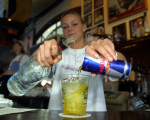Energy drinks have always seemed to go hand in hand with alcoholic beverages, and the reason might have something to do with the results exacted from a recent study by the Australian National University’s Center for Research on Aging, Health, and Well-being in Canberra. After recruiting 75 individuals—ages ranging from 18 to 30 years—for the study, researchers had each participant try one of two mixtures—a vodka, juice, and soda water mixture, and another similar concoction, but with a popular energy drink mixed in instead of the water—and determine whether they felt the need to keep drinking or not. As you might have already guessed, those who drank the energy drink mixture felt the need to keep drinking. But why?
Rebecca McKetin, co-author for the study, explains (via Reuters):
“We normally think of alcohol as a depressant, but it also has a stimulant effect, and it is this stimulant effect that is most strongly related to how much we like alcohol, and whether we want to keep drinking. Energy drinks contain caffeine. Caffeine, being a stimulant, tends to bring out the stimulant effects of alcohol intoxication. It may be this that causes energy drinks to increase the desire to keep drinking alcohol.”
Now, the fact of the matter is that the individuals who want to get drunk (usually with these sorts of drinks) hardly care to regulate the amount of alcohol entering their system. But the data clearly denotes a disturbing fact that said drinkers might not fully comprehend the excess of alcohol that is entering their system because of “stimulants” such as Red Bull and whatnot which serve to essentially numb the drowsiness that a neat drinker might experience. We’ve already discussed the dangers of being “wide awake drunk”, and now we know that a person is likely to continue drinking while in such a state.
As an aside, the researchers of the Australian study acknowledge that they could not confirm whether it was the sweetness of the energy drink or the caffeine-inducing effects that caused tasters to want to keep drinking; but McKetin adds that previous research suggests it is the caffeine rather than the sweetness that is causing the effect.
“The new research alone is not enough to advocate for policies restricting the availability of energy drinks in bars, because they can’t be sure how people respond to alcohol and energy drink mixtures in real life situations.”
What do you think?








